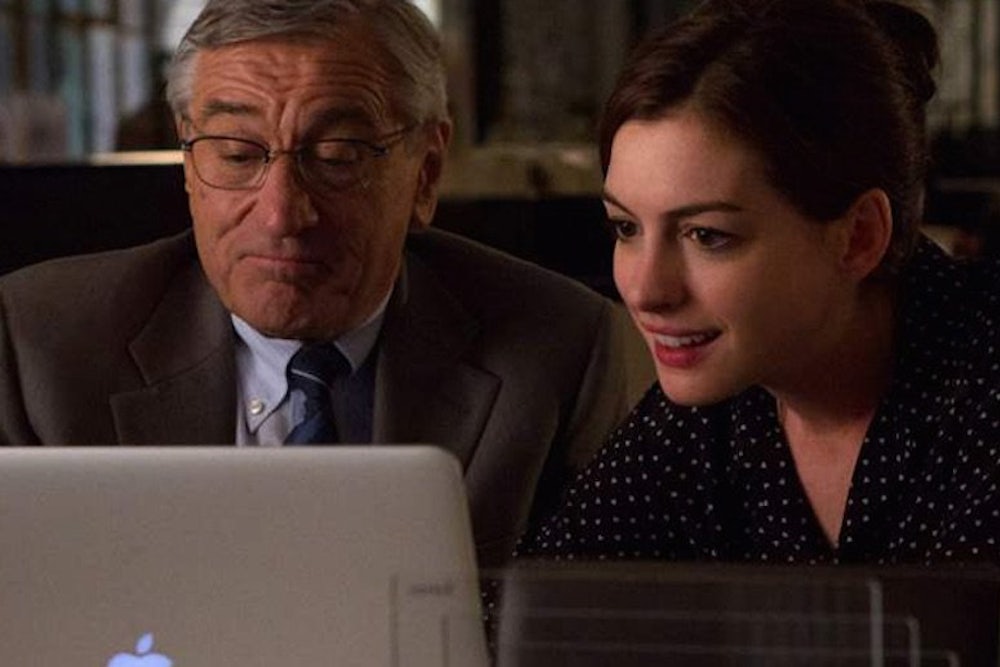Joblessness and underemployment have become facts of life for Americans stuck at the bottom of the economy. Wages remain sluggish, and although the U.S. is adding jobs, a substantial number of people have been out of the workforce so long they've given up on finding anything. It's the perfect time, then, for Hollywood to illuminate the depth of our dramatic economic plight—with a comedy about the difficulties of work/life balance for the very wealthy.
The Intern, out this week, stars Robert De Niro as Ben, a wise septuagenarian widower who is so bored of retirement that he applies to be an intern at an e-clothing company owned and run by Jules, a young go-getter played by Ann Hathaway. At first glance, the film seems to confront the problem of unemployment head on, as it begins with Ben’s search for employment, complete with a newfangled web-video cover letter. More, his function in the film is to reassure Jules about the value, and necessity of work. Though she's built her company from the ground up in a year and a half, she's worried that she's overcommitted. She's thinking about bringing in a CEO to manage the business for her and give her more time to spend with her stay-at-home husband and daughter.
Spending time with your family doesn't seem like it should be a bad thing. But the film disagrees. For an executive to want to see more of her husband and kid is presented as a failure of feminism. And so it's up to gung-ho Ben to remind Jules that she's created a successful company out of whole cloth, and that she doesn't need to cut back her hours to spend more time with her family. Thus, the aging guy is framed as the pro-equality voice—the one who sees that women are as good as anyone, and who encourages them to embrace the transcendent pleasures of sitting at a desk 24/7 just like their male colleagues. The message of The Intern is that work is an absolute good; it leads to happiness, friendship, equality, and even love (Ben starts dating the in-house masseuse).
For a substantial number of people off-screen, of course, work is not an absolute good, but a necessary evil. But in The Intern, everyone seems to see their job as a matter of personal fulfillment; no one works for money. Ben apparently has a substantial nest egg, which is not the case for many retirees. He had worked as an executive overseeing the printing of phone books—the factory he once managed has ironically been converted into office space for Jules's internet company. But this tech-fueled turnover, which must have eliminated many working-class jobs, is treated as an adorable irony. The internet took away Ben's job, but only when Ben no longer needed it. The timing of his redundancy was so perfect that he apparently didn't even notice that he dodged the ax.
Nor does Ben evince any bitterness at having been turned from a high-powered executive into an entry-level assistant. He's just happy to be working—or possibly volunteering. It's never clear whether he's drawing a salary or not. In fact, salary is never even mentioned, let alone renegotiated, as Ben takes on increasingly more responsibility. Does he get a boost in pay when he reanalyzes and reworks the company's advertising strategy? What about when he sees Jules's driver drinking from a flask on the job and engineers the man's ouster so that he himself can take his place? Is Ben an overachiever who earns raises at the expense of a fellow employee, or does he put this poor schlub on the street for the sheer joy of boot-licking. You don't have to defend drinking and driving to wince at the smug efficiency with which the salaried working-class guy is humiliated and shelved in favor of the hobbyist who may not even be getting paid. Ben's commitment to the company, and to his boss' self-actualization, is supposed to be a sign of his virtue. Good employees love their employer—and never think about money.
And Ben is a good employee, it seems, because of his age: Jules says he's a holdover from a better, more gallant period of manliness. But since the film isn't willing to acknowledge today’s economic problems, her nostalgia feels out of place. Why does Ben have confidence and gravitas? What is the content of his old-fashioned dignity? Maybe it has something to do with the fact that he worked at a time when people had lifetime nine-to-five jobs; when America had a middle-class which didn't have to cobble together part-time jobs in order to make ends meet. Maybe his classy suits and lovely house (both of which are commented on repeatedly) aren't proof of his fine character, but the product of a time when it was possible for work to result in steady accumulation of sufficient wealth.
The dream of such a time (to whatever extent it actually existed) hangs around Ben like a mantle, never acknowledged or looked at directly. He is a lovable mascot for workplace commitment and the good things that flow from it. That those good things may no longer flow from it—that you may put in the time and the effort and get back only an unpaid internship—is papered over with mugging and feel-good set-pieces. Why should you care about a fair wage when you can hold your boss' head as she pukes into a garbage can? For all the truly virtuous interns, after all, work is its own reward.
